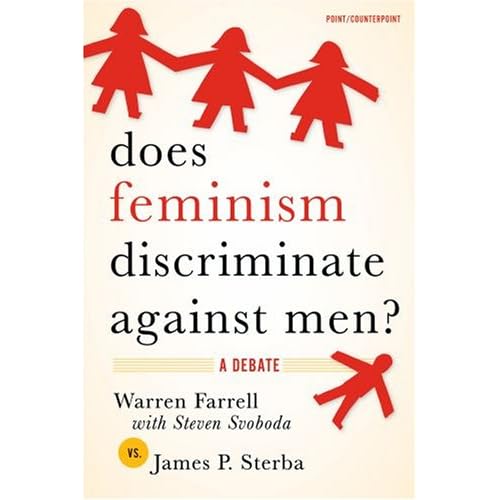 H-Net (Humanities and Social Sciences Online) posted this review of the newest anti-feminist book by Warren Farrell. I'm not really a fan of Farrell, as I have mentioned before (here and here). Although Ken Wilber thinks he is integral, I have my doubts.
H-Net (Humanities and Social Sciences Online) posted this review of the newest anti-feminist book by Warren Farrell. I'm not really a fan of Farrell, as I have mentioned before (here and here). Although Ken Wilber thinks he is integral, I have my doubts.I don't get the sense that Farrell (who is answered in his positions, apparently weakly, by James Sterba) is offering anything new here, but I offer this for those who might be more sympathetic to Farrell's arguments.
Does Feminism Discriminate against Men? A Debate. New York: Oxford University Press, 2008. 258 pp. Bibliography, index. $39.00 (cloth), ISBN 978-0-19-531282-9; $16.95 (paper), ISBN 978-0-19-531283-6.Read the rest of this excellent review.Does Feminism Cause Injustice to Men?The title of this book is not ideal, though my own may be no better. Either way, we must first define "feminism" in order to discuss whether or not it injures the rights of men. One Trotskyist group makes a distinction between "women's liberation" (good) and "feminism" (bad). Christina Hoff Sommers distinguishes between "feminism" (good) and "gender feminism" (bad).[1] Camille Paglia describes herself as "absolutely a feminist," but sharply criticizes "PC feminism."[2] Wendy McElroy distinguishes three forms: "liberal feminism" (the ideology of the 1960s); "gender feminism" (the dogmatic, men-are-the-enemy form); and "individualist feminism" (her own preferred form).[3] The trouble is that very few people observe distinctions, and are likely to end up examining both the good and the bad aspects of a single ideology. In an interview with Steven Svoboda, Warren Farrell said: "I'm a 100 percent supporter of the portions of feminism that are empowering to women and a 100 percent opponent of the portions that hone victimhood as a fine art".[4]
The title of the book is also misleading, as there is no true debate. Farrell presents his case--thirteen areas in which he believes that feminism discriminates against males, then James Sterba challenges Farrell's arguments. But Farrell is not allowed a rebuttal, and Sterba's arguments are less than convincing. Farrell is still a feminist, so his argumentation lacks the vigor that a forthright opponent of feminism might bring to the case for men's rights. He often sounds like a marriage counselor (which indeed he is)--concerned with helping men and women "listen" to each other, rather than with decrying the real injustices that are done to men and boys (and women and girls). Farrell started off as an enthusiastic supporter of feminism, writing The Liberated Man (1974), a book that considered the ways in which men could support the women's movement. He was in great demand as a speaker, and was elected three times to the Board of the National Organization for Women. Then, as he began to see things from men's perspectives: "Almost overnight my standing ovations disintegrated" (p. 5). He wrote two more books, Why Men Are the Way They Are (1986) and The Myth of Male Power (1993), thereby becoming persona non grata to the feminists and an elder statesman to the fledgling men's movement.
The thirteen issues (and chapter headings) examined by Farrell and Sterba are as follows: (1) "Do We Need Men's Studies?"; (2) "Do Men Have the Power?"; (3) "What the All-Male Draft and the Combat Exclusion of Women Tell Us about Men, Women, and Feminism"; (4) "Why Do Men Die Sooner, and Whose Health is Being Neglected?"; (5) "Domestic Violence: Who is Doing the Battering, and What's the Solution?"; (6) "The Politics and Psychology of Rape, Sex, and Love"; (7) "Does the Criminal Justice System Discriminate against Men?"; (8) "Why Men Earn More: Discrimination? Choices?"; (9) "Are Women Doing Two Jobs while Men Do One?"; (10) "Marriage, Divorce, and Child Custody"; (11) "Does Popular Culture Discriminate against Men?"; (12) "Are Schools Biased against Girls? Or Boys?"; and (13) "The Future of Feminism and Men."
For each issue Farrell finds evidence of anti-male discrimination, and Sterba in turn minimizes it. Obviously, it would be beyond the scope of this review to go into all of these, so I'll concentrate on four issues where Farrell's case is strongest: health, domestic violence, rape, and the criminal justice system.
No comments:
Post a Comment